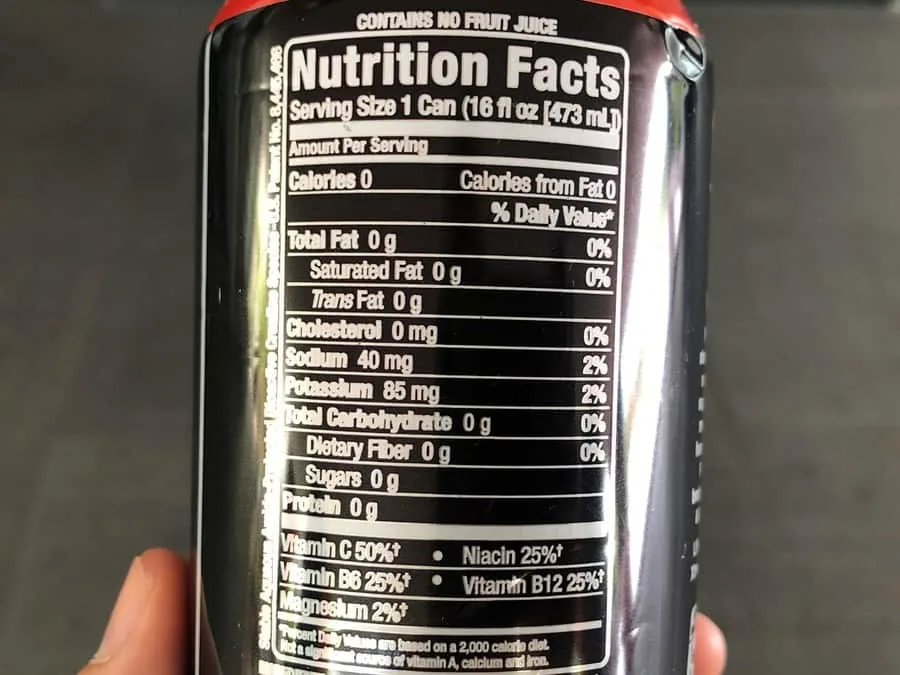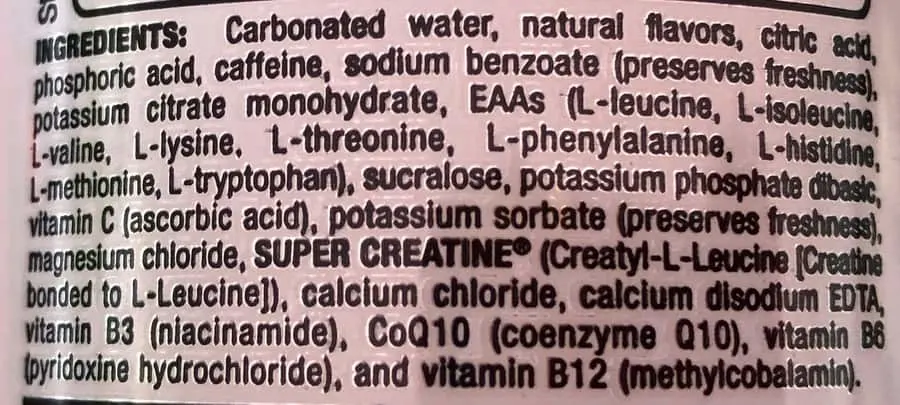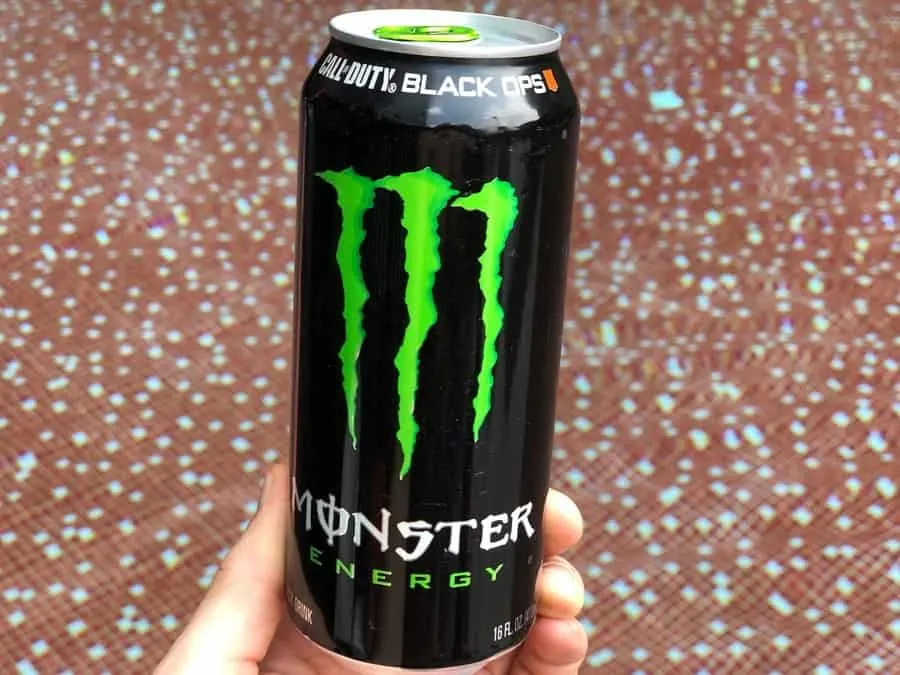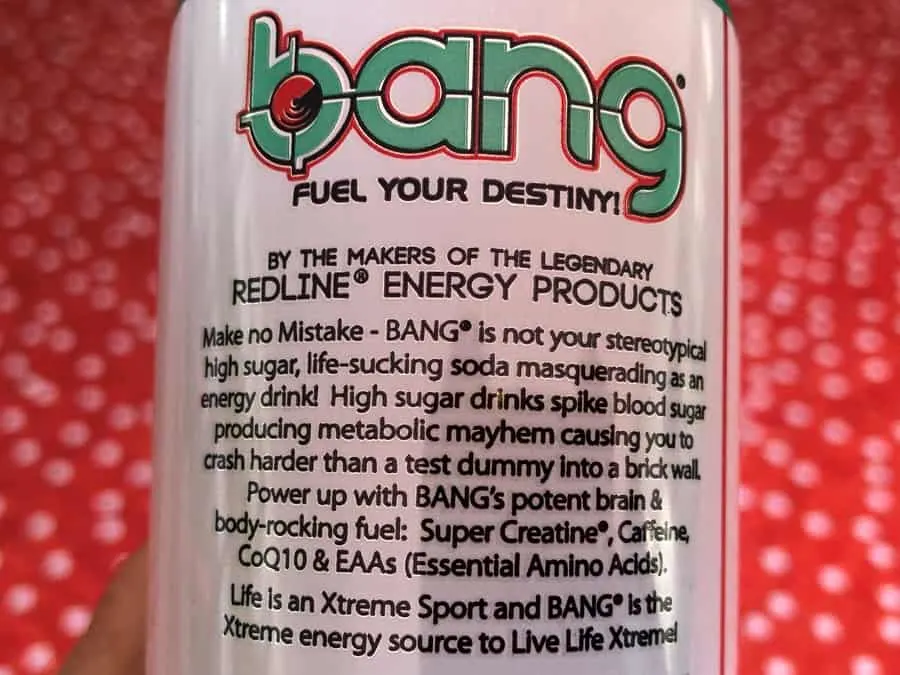Chock-full of caffeine, and various other ingredients, Bang Energy seems to be an energy drink dedicated to a hardcore image based around exercise and fitness.
But does Bang actually work though?
Well, for the short answer, Bang Energy definitely works. With Bang’s massive 300mg of caffeine, it would be more surprising if it didn’t.
Of course, there’s a lot more to Bang Energy than just another means of getting caffeine into your system, so read on if you want to know what works (and what doesn’t) in Bang Energy Drinks.
Contents
Bang Energy Drink Nutrition Facts
Nutrition facts of a regular 16 fl.oz can of Bang Energy:
| Typical Values | Bang (16 fl.oz) |
| Calories | 0 calories |
| Protein | 0g |
| Fat (Trans Fat) | 0g (0g) |
| Carbohydrate (Dietary Fiber) (Sugars) | 0g (0g) (0g) |
| Sodium | 40mg |
| Caffeine | 300mg |
| Vitamin B3 (Niacin) | 5mg |
| Vitamin B6 | 0.5mg |
| Vitamin B12 | 1.5μg |
| Vitamin C | 27mg |
| Magnesium | 5mg |
| Calcium | 5mg |

How Many Calories Are In Bang?
A standard 16 fl.oz can of Bang has zero calories, which makes it a great drink for you, especially if you’re trying to be mindful of your daily caloric intake.
With zero calories, Bang is comparatively healthier than many other energy drinks, which generally have quite a bit of sugar in them.
This means you can have a can of Bang without worrying about how many calories it’ll add to your overall diet, which makes it a great pick-me-up for when you need an energy drink, but also don’t want to ruin your overall diet.
Be warned, though, Bang’s zero-calorie nature does mean your cells don’t get any substantial amounts of actual energy, so a can of Bang shouldn’t be a substitute for a proper meal.
For a healthy young adult, your body typically needs around 2000 to 2400 calories and 2400 to 3000 calories for women and men, respectively.
So, be sure to have a decent meal along with your can of Bang Energy, or you’re not going to have the energy you need to fuel your cells.
Bang Energy Drink Ingredients
Here’s a quick list of the Bang Energy Drink ingredients to let you know what goes into each can:
- Carbonated water
- Natural flavors
- Citric acid
- Caffeine
- Sodium benzoate (preserves freshness)
- Potassium citrate monohydrate
- EAAs (L-leucine, L-isoleucine, L-valine, L-lysine, L-threonine, L-phenylalanine, L-histidine, L-methionine, L-tryptophan)
- Sucralose
- Potassium phosphate dibasic
- Vitamin C (ascorbic acid)
- Potassium sorbate (preserves freshness)
- Magnesium chloride
- SUPER CREATINE® (Creatyl-L-Leucine [Creatine bonded to L-Leucine])
- Calcium chloride
- Calcium disodium EDTA
- Vitamin B3 (niacinamide)
- CoQ10 (coenzyme Q10)
- Vitamin B6 (pyridoxine hydrochloride)
- Vitamin B12 (methylcobalamin)

Does the creatine in Bang actually do anything?
The creatine in Bang energy drink is a supplement that is popular among athletes and bodybuilders. It is frequently used to improve exercise performance and muscle mass. The evidence for these effects, however, is mixed.
Some research suggests that creatine can enhance exercise performance, while others show no benefit. It is unknown whether creatine supplementation works to increase muscle mass.
Why is there CoQ10 in Bang?
Bang contains CoQ10 because it is an energy drink. It is a nutrient found in all cells of the body.
Furthermore, CoQ10 is necessary for the production of energy in cells as well as the health of the mitochondria. Because CoQ10 levels decline with age, supplementation may benefit people over 40.
How Much Caffeine Is In Bang Energy?
Each 16 fl.oz can of Bang Energy Drink has 300mg of caffeine, which is around the same amount as you’d get from drinking three cups of coffee.
Caffeine is one of the most commonly used stimulants in the world, with caffeinated drinks such as coffee and energy drinks being consumed by billions of people around the world on a daily basis.
However, more caffeine isn’t always better than less caffeine. I think that the 300mg of caffeine inside each can of Bang is excessive.
Personally, as someone who likes the caffeine in their caffeinated around the 100mg per serving mark, Bang’s exceptionally high caffeine content puts me off it a little.
But depending on how well-acquainted you are with caffeine, 300mg might be the right amount to get you going, especially if you’re already used to having a lot of caffeine in your coffee or energy drinks every day.
That being said, lab test results have shown that Bang might actually have a much lower amount of caffeine than advertised, so you might not be getting the rush you were hoping from a can of Bang.
In any case, be sure not to have too much caffeine from any source.
The FDA recommends a maximum caffeine intake of 400mg per day. Having more than that, or more than what you can usually tolerate can lead to some serious side effects, such as:
- Insomnia
- Shakiness
- Anxiousness
- Stomachache
- Nausea
- Headaches
Considering Bang has around double the caffeine that you would find in a regular can of Rockstar or Monster (which come in the same size can as Bang does), it’s important to know your own caffeine tolerance before deciding to have a can of Bang willy-nilly.
As with any caffeinated beverage, be sure not to have too many cans of Bang in a short time, and try not to add any coffee or tea into the mix, or else that nice energy boost that you were hoping for might end up being a pretty bad headache instead.
For more information on caffeine and what it does to you, take a look at this video, it’s pretty informative:
Does Bang Energy Have Sugar?
Bang Energy Drinks are entirely sugar-free, so from a sugar perspective, it won’t have any detrimental impact on your health.
As the AHA recommends you should limit your daily sugar consumption to not more than 36g (150 calories) for men and 25g (100 calories) for women, it’s pretty easy to go over that limit with a single sugary soda or energy drink.
Bang being sugar-free also means you don’t have to worry about how much sugar you’re putting into your body.
You also don’t have to worry about inducing a sugar crash, unlike many other sugar-filled energy drinks.
While you may not get the same dopamine rush you often feel after a sugary energy drink, I think it’s a pretty good tradeoff for having a consistent energy boost without any noticeable side effects after the effects of caffeine start to wear off.
Does Bang Have Artificial Sweeteners?
Bang’s sweet taste is mainly due to the artificial sweetener present in the ingredients, which is the sugar substitute sucralose.
Because sucralose is a zero-calorie sweetener, you won’t have to worry about it adding to your daily sugar limit or spiking your blood sugar levels, which is a good thing.
But despite having a lower nutritional impact on you than normal sugar, artificial sweeteners such as sucralose are often the topic of various health concerns, with their low-calorie nature and artificiality being a point of contention for some.
While controversies exist, it’s worth noting that the FDA has approved the use of artificial sweeteners, so as long as you’re not having too many drinks with artificial sweeteners in them you shouldn’t need to worry much.
Other Notable Ingredients In Bang
EAAs
Bang contains the full set of essential amino acids, all of which play an essential part in maintaining bodily functions, especially since you can only get them from an external source.
EAAs are essential amino acids that can’t be produced naturally by the body, with it mainly coming from external sources, such as food and supplements.
That being said, if you happen to have a well-rounded diet, you’re probably already getting enough EAAs as it is, so the EAA content in Bang may not really do much to add to its effectiveness as an energy drink.
B-Vitamins
B-Vitamins go hand-in-hand with energy drinks, so it should be no surprise that Bang has a healthy serving of B-Vitamins as well.
The Vitamins present in Bang are Vitamin B3, B6, and B12, which is as average as you can get for an energy drink.
While not as plentiful as other energy drinks, the B-Vitamin content is a welcome addition to Bang.
| B-Vitamins | Purpose | Amount Per 16 fl.oz of Bang |
| B3 | Helps the body release energy. | 5mg |
| B6 | Store energy from protein and carbohydrates, | 0.5mg |
| B12 | Release energy from food. | 1.5µg |
For a more in-depth look at B-Vitamins, this handy website provided by the UK’s NHS might prove useful.
Is Bang Better For You Than Monster?

| Bang (16 fl.oz) | Monster (16 fl.oz) | |
| Calories | 0 calories | 210 calories |
| Sugar | 0g | 54g |
| Caffeine | 300mg | 160mg |
| Price Per Can | Around $2.50 | Around $2 |
Based on their respective nutritional facts, Bang definitely seems to have a leg up on Monster, although Monster’s lower caffeine and price might make it a more attractive option for some.
Here are the essentials regarding Bang vs. Monster:
- Bang has a lower amount of calories than Monster (0 calories vs. 210 calories)
- Bang has a lower amount of sugar than Monster (0g vs. 54g)
- Bang has a higher amount of caffeine than Monster (300mg vs. 160mg)
- Bang has a higher price than Monster (Around $2.50 vs. $2)
From a health perspective, Bang seems better for you since it doesn’t contain any sugar, while Monster’s high sugar content is definitely not the healthiest option out there.
However, Monster’s lower caffeine makes it a lot more tolerable for you, especially if you’re at all sensitive to caffeine, and it’s less likely to give you any caffeine-induced side effects compared to the staggering 300mg in Bang.
Monster’s cheaper price is also something to consider. Being approximately 30% cheaper than a can of Bang certainly makes Monster considerably more affordable, especially if you’re planning on drinking either brand every day.
In any case, if you just need a quick boost and you aren’t too concerned about the consequences, Monster might be the more cost-effective choice. But, if you’d prefer to avoid all the sugar, Bang might be the better choice.
Try them both and make up your own mind about which you prefer.
Speaking of which, if you’re thinking about buying Bang, but want to make sure that you don’t pay more than you need to, check out my other article that is the definitive resource on where to buy Bang online.
How Many Bangs Can I Drink A Day?
I personally think that you should, at most, only have 1 can of Bang per day, with the reason being that Bang has a massive amount of caffeine, and having 2 cans a day is probably just asking for trouble.
While you don’t have to concern yourself with the calories and sugar in Bang as you would with a typical sugary energy drink, it’s 300mg of caffeine is certainly a pretty good reason to stick with no more than one can per day.
Having 2 cans of Bang places you at 600mg of caffeine consumed for the day, which is definitely way over the FDA‘s recommended limit of no more than 400mg per day.
So, for the best results, and to avoid any unwanted caffeine-induced side effects, having a single can of Bang a day, when necessary, is probably your best bet.
Never have more than a single can of Bang in a day due to the high caffeine content.
Bang Energy Drink Flavors
With 25 flavors to choose from, there’s definitely a Bang for everyone. Here’s a selection of some of the more notable flavors:
- Black Cherry Vanilla
- Blue Razz®
- Champagne
- Candy Apple Crisp
- Cherry Blade Lemonade
- Purple Haze
- Root Beer
- Radical Skadattle
- Rainbow Unicorn
- Sour Heads
- Star Blast®
- Birthday Cake Bash
- Miami Cola
Does Bang Energy Actually Work?

I believe that while Bang definitely works, but the super-high amount of caffeine really isn’t for everyone, especially if your caffeine tolerance isn’t the best.
As a zero-calorie energy drink, Bang provides you with the energy and focus boost that you need, mainly through the action of the caffeine present in the ingredients.
As a stimulant, caffeine is particularly potent for improving reaction times, reducing fatigue, and improving psychomotor performance, as detailed in various scientific journals.
So in a sense, as long as the caffeine in Bang isn’t too much for you, Bang Energy will definitely help you to push through those long working hours or give you a bit of an edge whether it’s in exercise or even during a long gaming session.
Once again and just to reiterate, 300mg of caffeine is quite a lot, so be 100% sure that you know how much you can handle before diving into a can of Bang Energy Drink.
I hope this article was helpful and informative, enjoy your day!
Read More About Bang
- Is there alcohol in Bang?
- When Does Bang Kick In?
- Bang Review (Is it worth the money?)
- Does Bang have creatine in it?
- Where to buy Bang Energy online
